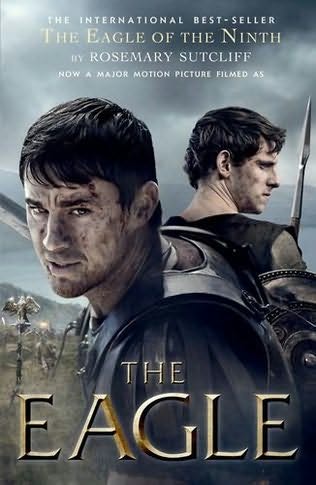
Hannah or I have been reading with Ian from a chapter book most every night for the last couple of years. I have enjoyed reading The Hobbit, Treasure Island, the Chronicles of Narnia, and the Three Investigators with him, and Hannah has tackled, among others, A Door in the Wall, Shadow Spinner, The Miraculous Journey of Edward Toulane, and The Tale of Desperaux.
Well recently, we finished reading Rosemary Sutcliff's Eagle of the Ninth, and I think this has been among my favorite books. IMHO, it's unfortunate that this is so often labeled under "Junior Classics" or some other such moniker, because the writing and thematic content is so much better and so much deeper than a lot of other adult fare that I've choked down. This book, while having enough action and strength of plot to keep a busy seven year old engaged, is also a fine piece of literature that is thoroughly enjoyable to a more discriminating reader.
The story is set in the early second century, A.D. amid a tense period in Roman-Briton relations. The Roman Empire had recently retreated behind Hadrian's wall, and the province of Valentia was abandoned to the tribes. When Marcus, our protagonist, is assigned to command a garrison on the frontier, he is thrown into the midst of the cultural conflict. With the backdrop of his father's legacy and under the shadow of disgrace cast by the lost Ninth Hispania legion his father commanded, the burden on Marcus to succeed in the Legions in heavy on him. His developing relationship with a local hunter foreshadows many of the themes developed later throughout the narrative: the cultural tension between Roman and Briton, the need for redemption and purpose, and the freedom and danger of the wild, free North. These themes are developed at length through his relationships with Esca a slave-gladiator, a wolf cub, and Cottia a local girl, each of whom affects him profoundly and transforms him significantly. His first encounter with the locals eventually deals Marcus a crippling wound which takes him out of the Legions and into a dark period of restlessness and uncertainty which ultimately lead him on a quest to recover the lost Eagle of the Ninth Legion. While historically, we know the end result of his quest, and this removes some of the tension from certain scenes, the journey is exciting, complex, and beautiful all at once.
Sutcliff uses a lot of imagery and displays sometimes stunning word choice. One of my favorites finds Marcus and Esca alone in the wilds of Caledonia:
It was an evening coloured like a dove's breast; a little wind feathered the shining water, and far out on the dreaming brightness many scattered islands seemed to float lightly as sleeping sea-birds.
Several times, I had to stop and reread a section to savor the words. Out loud. To Ian (who was rolling his eye's I'm sure). Actually, he really got into it, and we had a lot of fun looking up some of the historical places and discussing the plot together. There was a brief exception to the enjoyment at the end when he was channeling the kid in The Princess Bride, bemoaning the possibility of a kiss, but if he rereads it in the future, it will no doubt be a different book for him then, and he may change his mind about that part. In any case, I'm sure I'll reread this book, and I highly recommend it to any who appreciate good writing and a good story.


1 comment:
I'll be checking it out from the library. We've packed all of our books in order to move, so this will be great! Thanks. :)
Post a Comment